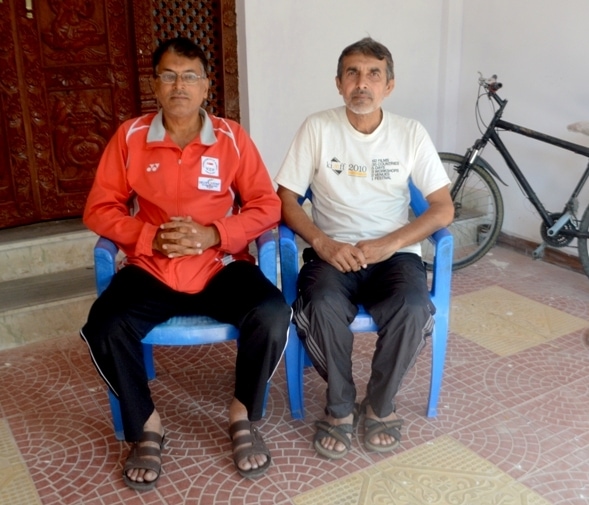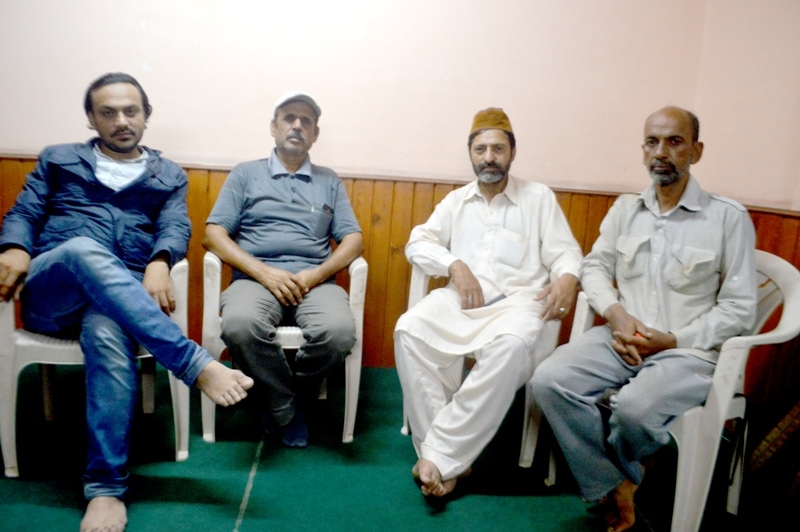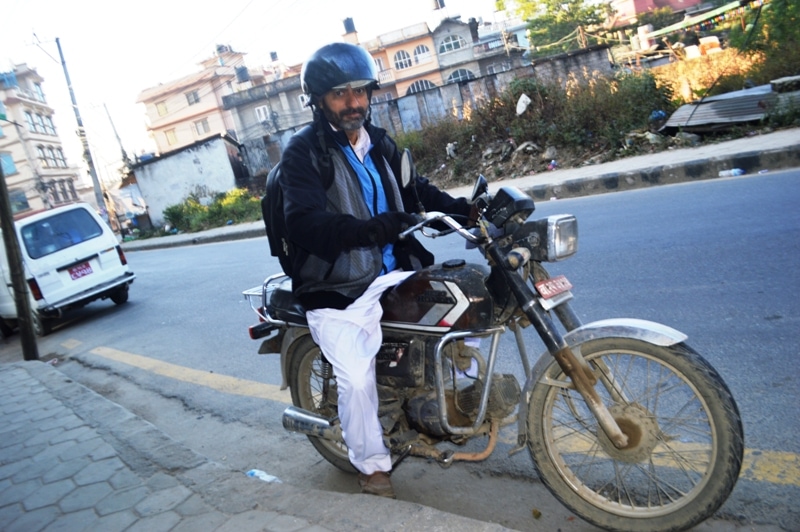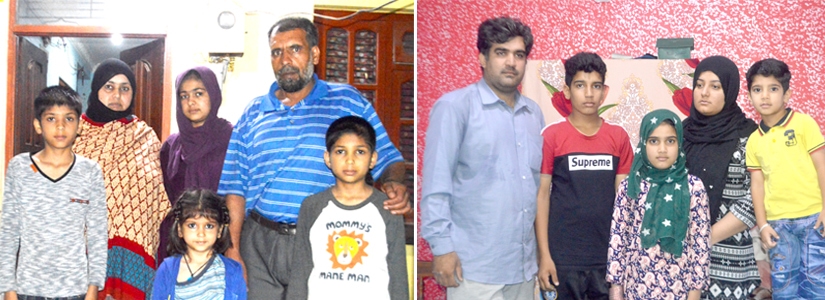Illegal immigrants have been surprisingly attracted to Nepal. One such family faces 10 million rupees in fine for overstay, according to the immigration law. But they still stay here. Why?
Gopal Gadtaula: Centre for Investigative Journalism-Nepal

Idris Ahamad and Abul Salam
Mansur Ahmad Siddique is a 41-year-old Pakistani national. He lives with his wife Samina and three daughters—Amatulla, Nigaris and Hiwatul–in Budhaneelkantha Municipality-8, Kathmandu. On May 11, 2011, the Nepali Embassy in Islamabad issued a tourist visa on his Pakistani passport DT5468231.
On the afternoon of October 13, 2011, five months after he obtained a visa for Nepal, Mansur and his family flew from Karachi to Kathmandu. Upon his arrival, he received a 30-day visa from the immigration section at the Tribhuvan International Airport.
But he didn’t leave Nepal even after the expiry of his visa. Instead, he started to work as a daily wage worker in Kathmandu. “I work as a porter,” Mansur said on the evening of August 11, 2018, nearly 8 years after he arrived here. “We don’t have anyone here. Our situation is worse,” said Mansur after offering his prayers at their community prayer hall in Budhaneelkantha-8. His daughter Hiwatul, who was born in Kathmandu, has a hole in her heart. He lamented that he was unable to fund for her medical treatment. “Many top Nepali officials know that Ahamdiyas like myself face danger in Pakistan, but they are yet to show their concerns,” he said.
Mansur couldn’t perform the last rites of his father who died in Pakistani city of Rawalpindi in the winter of 2016. “On the day he died, I was carrying sacks of cements to bring food to the table for my family,” he said.
On November 14, 2018, Mansur’s family completed 2544 days in Nepal. His family of five has to pay 25 US dollars per day in order to make his stay in Nepal legal. According to Nepal’s immigration regulation, his family carries a fine of 7.314 million Nepali rupees.
According to the regulation, the tourists who overstay are fined 2 US dollars for each day and an additional fine of 3 US dollars for each day overstayed. Under the law, a tourist can stay no longer than five months (150 days) at a time.
Fifty-eight-year-old Rashid Ahamad is from Multan village of Khanewal district in Pakistan. Before he and his family flew to Nepal in 2013, he ran a cassette shop.
After two motorbike-borne assailants tried to kill his son, he sold his shop worth 200,000 rupees for 20,000 rupees and left for Nepal. He lives with his wife Rasida, 57, two sons Imran, 28 and Mohsin, 24 and a daughter Sahajiba ,21, in Kathmandu.
His three daughters have married and settled down. Aaliya lives with her family in Multan in Pakistan, Faiza in Karachi and Farzana in the United States. “Gradually, we got into huge trouble,” he said when we met in Dhumbarahi on August 13, 2018.
Fifty-four-year-old Abdus Salam used to run a transport business in Sindh province of Pakistan. He earned over 40,000 Pakistani rupees a month from his business. “The Ahamadiya community lived in fear, but we hadn’t expected to be displaced so soon,” he said. After four Ahamadiyas were killed in Karachi in March 2013, he gave up hope and left for Nepal.
He boarded a Pakistan International Airlines plane to Kathmandu. In an unfamiliar place, all he could find was work as a laborer. He earns a living for the five-member family by working as a construction laborer. He makes 500-700 rupees daily. Work remains uncertain. Two of his children teach at a private school, which supports the family pay their expenses. One of his daughters is studying in grade 12.
Millions of rupees in fine
Around 173 Pakistani Ahamadiyas have overstayed in Nepal, with Mansur saddled with highest amount of fine. His family of five, whom have overstayed for seven years, owes 63,875 USD dollars to the Department of Immigration. The amount is 7.345 million rupees.

(Left to Right) Arif Minas, Rauf Mohamad, Mohamad Akram and Abud Uddin
The family of Rashid arrived on June 10, 2013 in Kathmandu, where they received an on arrival visa for a month. But his family is saddled with 48600 US dollars (5.589 million rupees) fine for overstay in Nepal. Every day, Rashid’s family’s fine increases by 25 US dollars.
Abdul’s family has overstayed in Nepal for over five years and six months. They face a fine of 50,650 US dollars (5.824 million rupees).
The four-member family of Rauf, who lived in a rented room in Budhaneelkantha-8, arrived in Nepal on April 22, 2013. Their tourist visa expired on May 22, 2013. Since then, the family was living illegally in Nepal.
On August 29, the family paid 4.5047 million rupees fine for overstaying in Nepal to the Department of Immigration. Five days later, he and his family flew to Canada to resettle in the country. According to a person familiar with the family, Rauf raised funds to pay the fine from his relatives resettled in the west and from the Ahamadiya community scattered across the globe.
Idris Sandhu, a 55-year-old, who says some of his relatives have been resettled in Germany and Canada, has been waiting for the government to waive his fine. On August 9, we met him at the room of Abdus Salam in Budhaneelkantha-8. “If the government waives my fine, I will begin the process to resettle my family in another country,” he said.
For the resettlement, the relatives who have already moved in the Western countries should initiate the process through immigration. The Pakistanis should present evidence that their life is at risk if they live in their native country. They said the UNHCR facilitates for the resettlement.
Once, Idris used to run a sugar mill in Karachi and earn 45,000 rupees a month. But he now has to support his wife who is suffering from depression and other ailment and his three children. “In Pakistan, we feared for our life. Here, we worry we may die of hunger,” said the distraught-looking man.
On August 27, 2012, his family traveled to Nepal. They have overstayed in Nepal for 2237 days until November 14, 2018. The five-member family faces a fine of over 55,800 USD dollars for overstaying during the period which comes to 6.417 million rupees in Nepalese currency.
Mohammad Rafiq, 53, is Idris’s brother. He has also been in Kathmandu for the last five years. His five-member family including his wife and children lives in the city. His two sons aged 27 and 23 years teach at a private boarding school. A 19-year-old daughter is studying in grade 12.
He is a daily wage worker. “Nepal government should not impose such hefty fine on people like us who have fled our country,” said Rafiq. If the burden of fine is lessened, he is thinking about resettling in a Western country. He expects his relatives who have been settled in Canada and Ahamadiya community to sponsor his family.
Thirty-eight-year-old Arif Minas from Karachi is a textile engineer. On May 7, 2013, he arrived in Nepal on a tourist visa. He left behind a two-storey house in Karachi, a job with 30,000 rupees monthly salary, and his family’s heritage. A brother has been resettled in Germany and a sister in Canada. His family including his wife and two children faces a fine of 39,540 US dollars until November 14, 2018, which is worth 4.547 million rupees. This amount is rising at a rate of 20 US dollars every day.
Mohammad Akram, 45, a father of four children, was a member of a well-to-do family. His home was located at Bhawalpur of Punjab province near the border of eastern Pakistan. He fled his country after suppression against Ahamadiya Muslim community increased. He left for Nepal with his 6 family members. “We haven’t found anyone who would hear our grievances,” he said. He said he decided to leave the country after 50 Ahamdiyas were killed after bombing in a mosque in Lahore five years ago. He is also a prayer leader of the Ahamadiya community.
Akram’s family faces a fine which totaled at 59,760 US dollars by November 14, 2018. This is about 6.872 million rupees. He works as a daily wage worker in Kathmandu. “The government should waive the fine. It’s not possible to pay from my earning as a daily wage worker,” he said. He had arrived in Nepal on April 22, 2013 on a tourist visa.
The 55-year-old Abil Uddin’s family has five members. He and his five children from ages 9 to 22 boarded a Pakistan International Airlines plane to Kathmandu on June 17, 2013. The family has overstayed since 17 July 2013, which made them illegal immigrants. Due to the over-stay, the family’s fine is rising. Until 14 November, 2018, his family owed $ 67,900, which is 7.8 million rupees. He works as a welder in Kathmandu. He is hardly able to support his family from daily wages.
A foreigner, regardless of the type of visa he or she obtains, is not allowed to work or engage in income generation in Nepal. What’s more, their visas are stamped with a warning: ‘strictly forbidden for employment’.
The real motive of those who arrive from Pakistan on tourist visa in Kathmandu appears to be to resettle in the United States, Europe or Canada. They also openly say this. After 2004, about 200 Pakistani Ahamadiyas have left for America and Canada, according to Mansur.
The record of the immigration office shows that Mansur’s statement is correct. Facing attacks for their religion in Pakistani, the Ahamadiyas plan to initiate a resettlement process via the United Nations High Commissioner for Refugees (UNHCR) in the neighboring countries. Rauf Ahamad, 53, was among such a group. He lived in Balochistan of Pakistan. He left behind 14 acre of farmland, a big house and a textile factory. His short-term goal was to escape from life-threatening situation back home and settle in a western country in the long-term.
Eye on Canada
Nepal has recognized only Bhutanese, who arrived via Kakkarbhitta check post in 1990 and Tibetans who came in 1959 as refugees. It doesn’t recognize immigrants from Myanmar, Bangladesh, Sri Lanka, Iran, Somalia, Afghanistan and Pakistan as refugees. The Nepal government has called the people who don’t live in camps ‘illegal immigrants.’

Mohamad Akram, from Budanilkantha, Kathmandu
If an Ahamadiya dies in Nepal, it is difficult to perform late rites. Muslims living here do not accept them as their members. In the last eight years, two Ahamadiya Muslims died in Nepal. Their bodies were sent to Pakistan for burial. In July 2013, Hamida, the mother of Mohamad Rafiq and Idris, died at the age of 78. Rafiq said they had to send her body via cargo to Pakistan. “We had to spend around Rs.2 lakh to transport the body. It was a big hassle,” said Rafiq. In 2013, the body of 55-year-old Ahmed Atau Rahman was sent to Pakistan on a cargo.
The United Nations High Commissioner for Refugees (UNHCR) has identified these immigrants as ‘urban refugees’. Apart from a 17000-rupee annual fund for their children’s education, the UNHCR doesn’t support the refugees. In recent year, the UNHCR has not been able to resettle ‘urban refugees’ in Western countries, which has increased their worries and penalties, according to them.
Several of the Ahamadiyas including Mohamad Akram, Abil Uddin and Mohammad Rafiq have sought Canadian sponsors. Provided by the Ahmadiya community and their relatives living in those countries, such sponsorship letter remains valid for a year. If they fail to leave Nepal within a year, they have to secure another sponsorship, which will not be easy, they say. Mohamad Akram is likely to miss the window because he couldn’t arrange money to pay his visa fines. “If the Nepal government could recognize our plight, we could get out of this situation,” he said.
Mohammed Akram wants to resettle his 6-member family in Canada. He has already started the process for this. In an email on March 16, 2018, the Canadian High Commission in Delhi enquired the family about the fine for overstay in Nepal. In the email, the official has said the process for resettlement couldn’t be forwarded if the fine is not clear in near future. Akram wants the Nepal government to waive the fine. “I cannot pay such a huge amount of money,” he said.
On 28th August, 2018, the Canadian High Commission, Delhi, sent him an email asking him and his family to be present with required documents at 2 pm on the next day. He along with his family arrived at the offices of VFS in Jawalakhel, where the fingerprint of all family members was taken. Now the process is stalled due to visa fine. If the penalty is to be paid or waived, he may soon fly to Canada. “But I’m stuck here,” he said.
The Pakistani embassy in Kathmandu, however, said the Ahamadiays’ statement was not true. “Many minorities in Pakistan are safe,” said an official from the embassy. “Why are they saying they are insecure? They should have the answer.”
Immigration: Mere Concerns
According to the statistics of Department of Immigration, Nepal has deported 483 foreigners from 63 countries in the last eight years. Bishnu Hari Upadhyay, a spokesman, said they included people who overstayed illegally, people who entered Nepal illegally and those arrested for various crimes. “It is a matter of national security,” said Upadhyay. He said some foreigners have come into Nepal to commit new types of crime. “The Bulgarians came to Nepal and hacked the ATMs. The Bangladeshis were involved in crimes related to telecommunications,” he said.

Families of Mohmad Daud and Murtaza Jafri
Among the deported, 59 were Bangladeshis, 66 Chinese, 64 Iranians and 34 Pakistanis. Similarly, 29 Syrians and 9 Eritreans have also been deported by the Department of Immigration.
According to the Department of Prison Management, 898 foreign prisoners are serving sentence in the country’s 33 jails. Among the convicts, 688 are Indians and 210 from the third countries. They were found involved in various types of crimes.
He said the Department has increased vigilance after foreigners were found involved in crimes such as drug trafficking, kidnapping, fraud and organized crime, fake currency, fake passport, arms smuggling.
India has established diplomatic relations with most of the countries. So citizens of those countries travel to India. Some of them enter Nepal by taking advantage of an open border. But the government doesn’t have an accurate figure on the illegal immigrants from third-party countries.
Fifty three Afghans from 13 families living in Tokha are among those who are not accounted for by any institution in Nepal. Thirty-four-year-old Murtaza Jafri and his family of four have been living in Nepal for three years. He fled southern Kandahar after Taliban insurgents intensified their activities there. He arrived in India in 2015 and entered Nepal. A few days after he arrived in New Delhi, a stranger promised him a trip to Nepal for 2500 US dollars. He now works at a grill factory in Kathmandu. His family members include wife Sadiga, 32 and three children.
Daud, 44, lives in Tokha with his wife Amida, 33, Fatima, 12, Murtaza, 8, and Lokam, 4. The family’s ancestral home was in Naiyawal, near Kandahar in Afghanistan. The family arrived in Nepal in 2015 via India and paid human trafficker in New Delhi a total of 6000 US dollars for a trip to Nepal, they said. “The illegal immigrants like these are linked to our security concern,” Upadhyay, the spokesman, said, “They and their family can cause headache to us anytime.”
Currently, 292 in Rohingya Muslims from Myanmar hold refugee identity cards from the UNHCR. A total of 639 immigrants, 240 families from 9 countries including Pakistan, Myanmar, Afghanistan, Sri Lanka, Somalia, Congo, Iran, Iraq and Bangladesh are illegal immigrants. So are additional 78 people of 37 families from Myanmar, Somalia and Iran, who have sought a refugee ID from the UNHCR.
Nepal has only recognized Tibetans and Bhutanese as refugees. Currently there are 24,500 Tibetans and 6,656 Bhutanese refugees in Nepal.
Hi-tech border control
Dr. Gopal Krishna Siwakoti, president of International Institute for Human Rights, Environment and Development (INHURED International), said Nepal’s policy towards immigrants is illiberal. Siwakoti, who served as the chair of Asia Pacific Refugee Rights Network, said, “Since Nepal has yet to formulate policies on immigrants and refugees and not signed the international conventions on refugees, immigrants and refugees are faced with lack of identity.”
Tourists can enter Nepal via border points at Kakkarbhitta, Birgunj, Belhiya, Nepalgunj, Dhangadi, Gadda Chauki, Rasuwa and Tribhuvan International Airport. Bishnu Hari Upadhyay, the spokesman at the Department of Immigration, said, “We are working to organize it well.” The Department, which collects fines for overstaying, has only now begun to collect basic information about them.
Foreigners began to arrive in Nepal after promulgation of the Foreigners Act. However, there is no record of how many foreign tourists entered Nepal and whether all of them returned home. In the last five years, 1424 people have paid fine for overstaying their visas and left the country, according to the Department.
A foreigner obtains a visa under one category and works in a different category is guilty of violating immigration laws. The Department is aware of people from Afghanistan, Burma, Sri Lanka, Bangladesh who arrived on tourist visa and now working in Nepal. “We need to regulate immigration and strictly impose rules. We are investigating some of the cases,” said Upadhyay.
All foreigners except holders of diplomatic passports who enter Nepal are counted as tourists. In the last two years (in 2016 and 2017), 1.676 million foreigners visited Nepal as tourists, according to the Department. During the period, 1.654 left Nepal. “We do not know where the rest of them are,” said Upadhyay.
Ishwar Raj Paudel, Director General of the Department of Immigration, said foreigners taking advantage of the open border can be the security challenge of the country any day.
“We are establishing high-tech border control system to regulate the flow of foreigners and to prevent international crime networks,” Paudel said. “We have submitted a proposal on creating a database of foreigners with the pictures of eye color and finger prints to Ministry of Home Affairs. The database will be shared with the police, home ministry and the Department,” he said on September 18, 2018. “You will see it coming into force in six months.”



